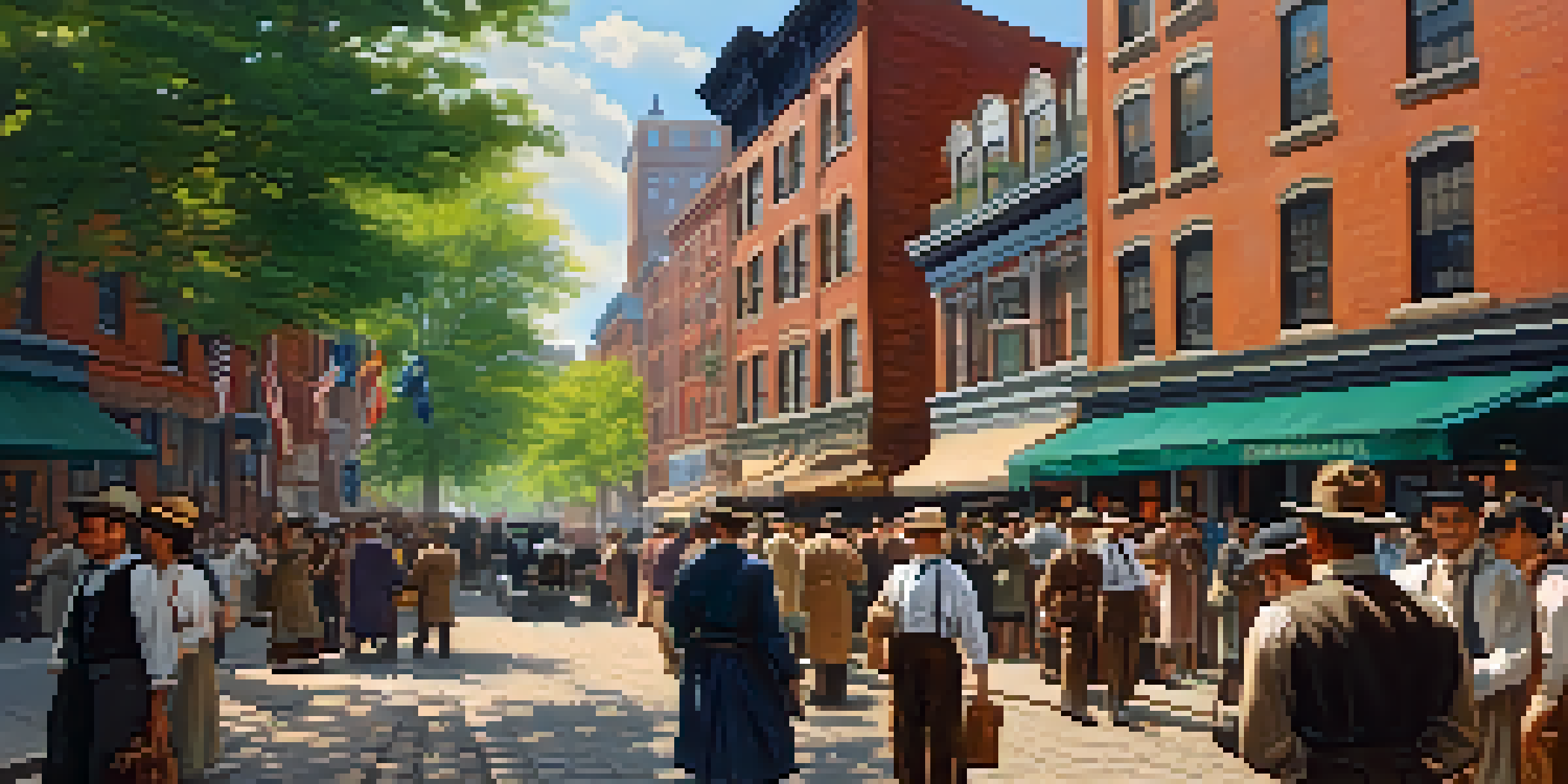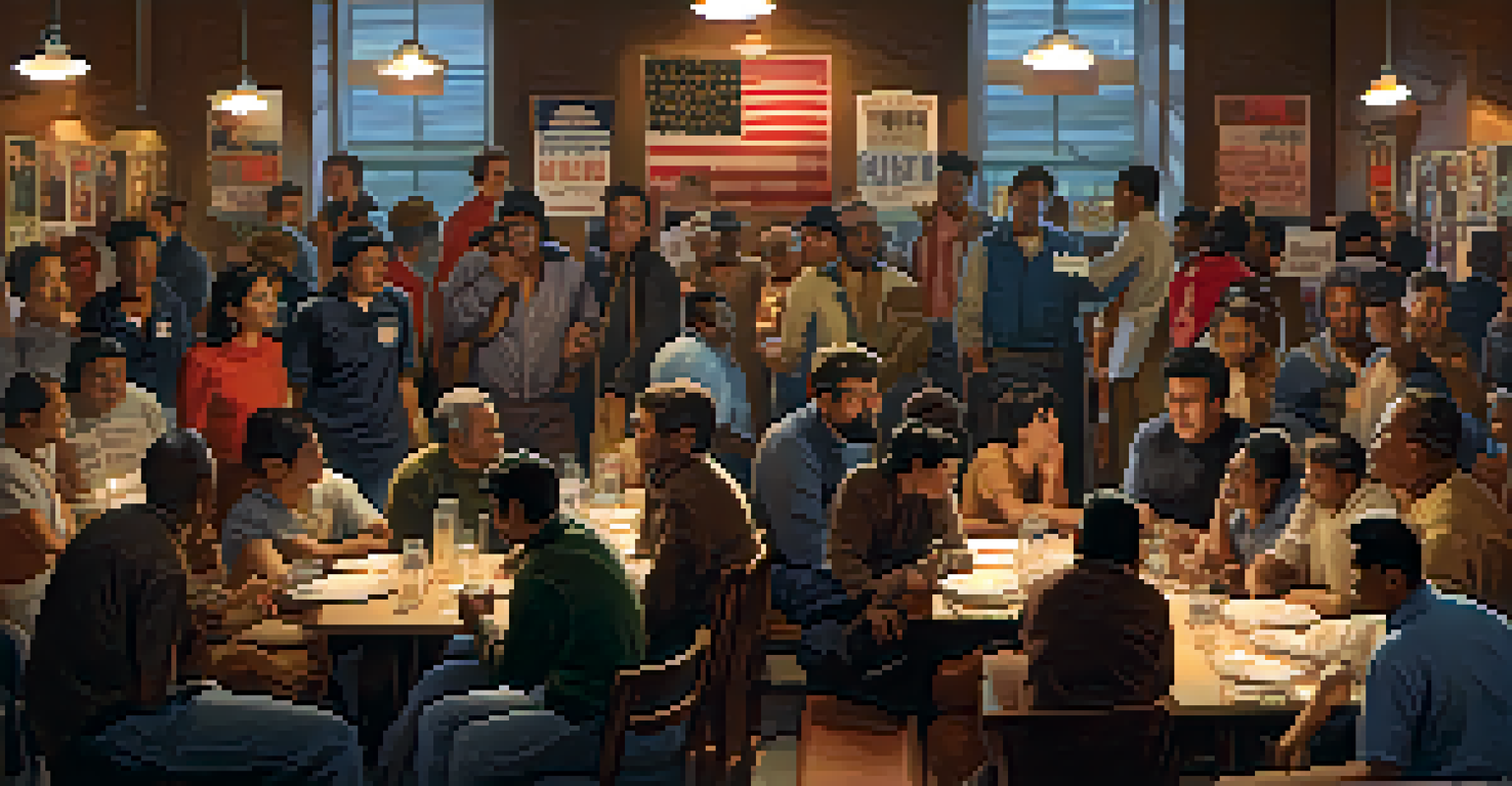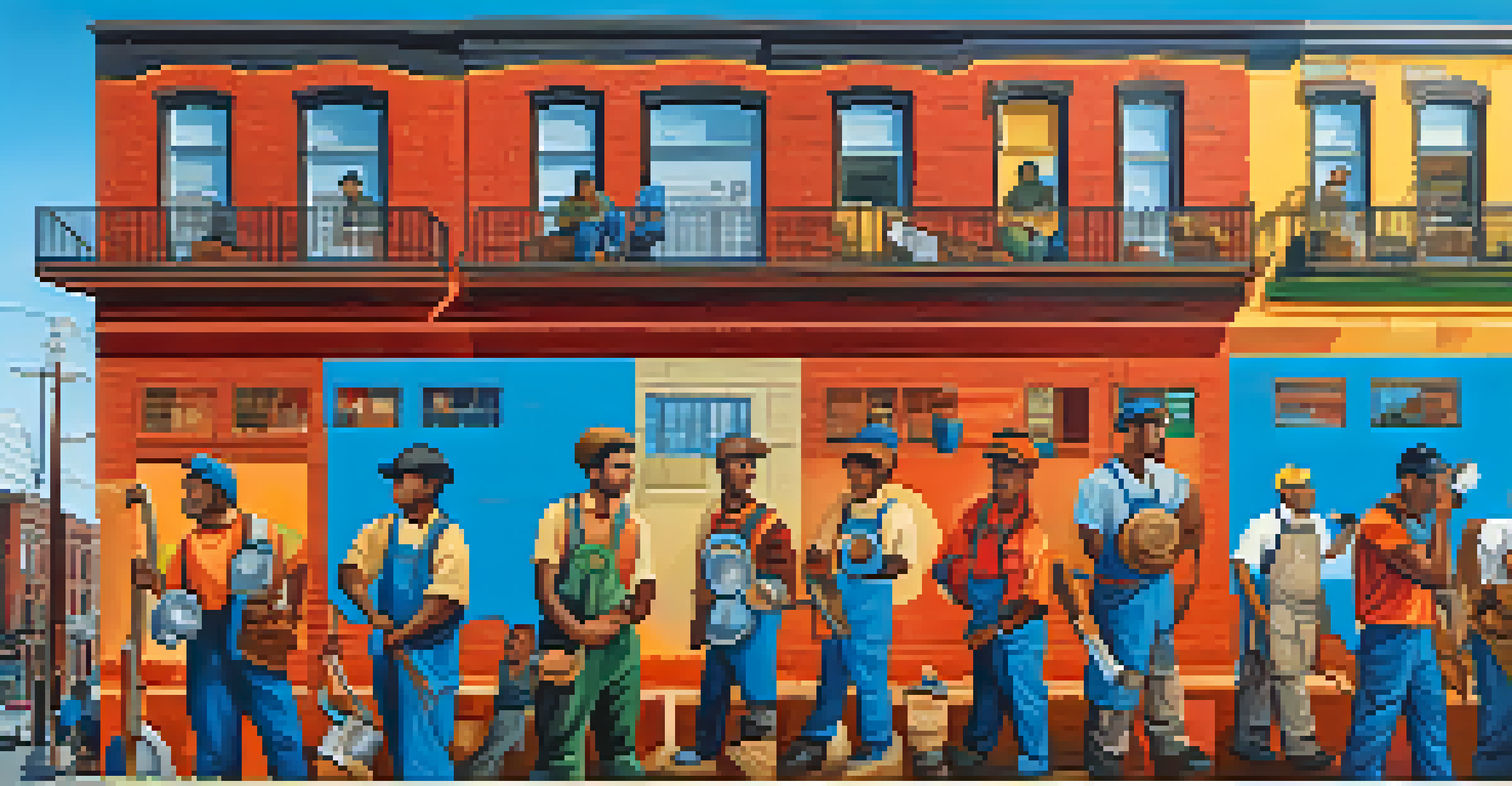The Role of Boston's Immigrants in Labor Struggles

A Historical Overview of Immigration in Boston
Boston has long been a melting pot of cultures, with waves of immigrants arriving since the 19th century. These newcomers brought diverse skills and perspectives, enriching the city's cultural fabric. Many immigrants settled in Boston seeking better opportunities, often taking on labor-intensive jobs in factories, shipyards, and construction.
The only way to deal with the future is to function efficiently in the now.
As the city grew, so did the immigrant population, which played a crucial role in meeting the labor demands of a rapidly industrializing society. For instance, Irish immigrants became a significant workforce during the construction of the city's railroads and buildings. Their contributions not only fueled economic growth but also laid the groundwork for future labor movements.
Understanding this historical context is essential to appreciating how immigrants became central figures in labor struggles. Their experiences shaped not only their lives but also the broader narrative of labor rights in Boston, setting the stage for activism and change.
The Rise of Labor Unions Among Immigrant Workers
In the late 19th and early 20th centuries, as immigrant workers faced harsh conditions, labor unions began to emerge. These unions sought to protect workers' rights, advocating for better wages, shorter hours, and safer working environments. Immigrants, often subjected to exploitation, found strength in numbers and began organizing to demand fair treatment.

For example, the formation of the United Hatters of North America in the early 1900s saw a significant number of immigrant workers uniting for better conditions in their trade. This unity not only empowered them but also highlighted the vital role immigrants played in the labor movement. Unions became a platform for these workers to voice their concerns and push for change.
Immigrants Shaped Boston's Labor History
The contributions of immigrant workers were pivotal in the development of labor movements and rights in Boston.
The solidarity among immigrant workers helped bridge cultural differences, creating a collective identity that transcended backgrounds. Their collective efforts contributed to the establishment of labor laws that benefited all workers, not just those born in the U.S., showcasing the power of unity in the face of adversity.
Notable Strikes and Protests Led by Immigrants
Throughout Boston's history, several notable strikes have been spearheaded by immigrant workers. One such event was the 1912 Bread and Roses strike, where immigrant women textile workers protested for fair wages and working conditions. This strike not only gained national attention but also underscored the pivotal role of immigrant voices in labor activism.
We are not makers of history. We are made by history.
Another significant moment was the 1934 Boston truck drivers' strike, which involved many immigrant workers demanding better pay and working conditions. These protests showcased the determination of immigrant laborers to fight against injustices, often risking their livelihoods for the sake of change. Their courage inspired future generations, solidifying their place in labor history.
These strikes were not just about wages; they represented a fight for dignity and respect in the workplace. The stories of these immigrant leaders serve as a reminder of the struggles faced and the progress achieved through collective action.
The Influence of Immigrants on Labor Legislation
As immigrant workers organized and protested, their efforts began to influence labor legislation in Boston and beyond. The advocacy of unions led to significant reforms, including the establishment of the minimum wage and workers' compensation laws. These changes were often driven by the relentless push from immigrant laborers seeking justice.
For instance, the Fair Labor Standards Act of 1938, which established minimum wage and overtime pay, was heavily influenced by the activism of immigrant workers. Their struggles highlighted the need for legal protections, leading lawmakers to recognize the importance of regulating labor practices. This shift marked a turning point in the fight for workers' rights.
Labor Unions Empower Immigrant Workers
Labor unions emerged as a powerful platform for immigrant workers to advocate for better wages and working conditions.
The legacy of immigrant involvement in labor legislation continues to shape discussions about workers' rights today. Their contributions remind us that the fight for fair treatment in the workplace is ongoing and that immigrant voices remain crucial in advocating for justice.
Cultural Impact of Immigrant Labor Movements
Beyond policy changes, immigrant labor movements have also had a profound cultural impact in Boston. The rich tapestry of immigrant experiences has influenced art, literature, and public discourse surrounding labor rights. This cultural heritage enriches the city's identity, emphasizing the diverse backgrounds that contribute to its labor history.
For example, murals and public art installations often celebrate the contributions of immigrant workers, turning their struggles into powerful narratives that resonate with the community. These artistic expressions serve as reminders of the importance of labor rights and the ongoing fight for equality. They help foster a sense of pride among immigrant communities.
The cultural legacy of these movements continues to inspire new generations, encouraging them to engage in advocacy and activism. By honoring the past, Boston's residents are reminded of the ongoing importance of solidarity and community in the fight for workers' rights.
Modern Immigrant Contributions to Boston's Labor Landscape
Today, immigrants continue to play a vital role in Boston's labor landscape, contributing to various sectors such as healthcare, technology, and hospitality. Their diverse skill sets and experiences enrich the workforce, driving innovation and economic growth. Many immigrants are not only workers but also entrepreneurs, creating jobs and opportunities in their communities.
As the city evolves, so do the challenges faced by immigrant workers, including issues related to immigration policy and workers' rights. Advocacy groups and labor unions continue to support these workers, acknowledging their contributions while fighting for equitable treatment. This ongoing support reflects the lessons learned from past struggles.
Cultural Legacy of Immigrant Activism
The cultural impact of immigrant labor movements continues to inspire advocacy and community pride in Boston today.
The resilience of immigrant workers today echoes the historical battles fought by their predecessors. Their stories of determination and advocacy remind us of the importance of inclusivity and the need for continued efforts to ensure equitable labor practices for all.
Looking Ahead: The Future of Immigrant Labor in Boston
As we look to the future, the role of immigrants in Boston's labor landscape remains crucial. With ongoing debates surrounding immigration policy and labor rights, it's essential to recognize the contributions of immigrant workers to the city's economy and culture. Their voices must be included in conversations about labor reform and social justice.
The future of labor movements will likely continue to be shaped by the experiences and activism of immigrant communities. By fostering solidarity across different groups, we can create a more inclusive labor movement that advocates for the rights of all workers. This collective effort can lead to meaningful changes that benefit everyone.

Ultimately, the story of Boston's immigrant labor struggles is one of resilience, community, and hope. By learning from the past and supporting the present, we can work towards a future where every worker's rights are honored and protected.